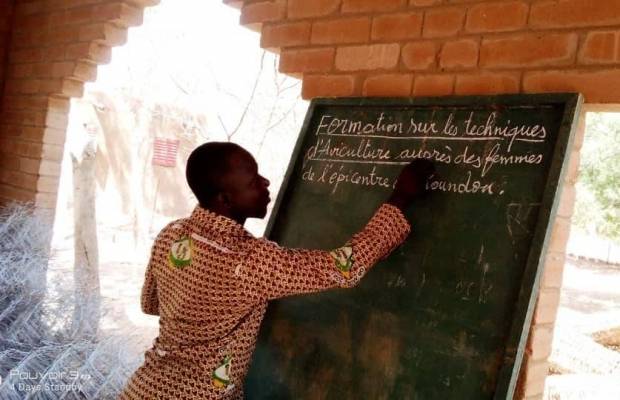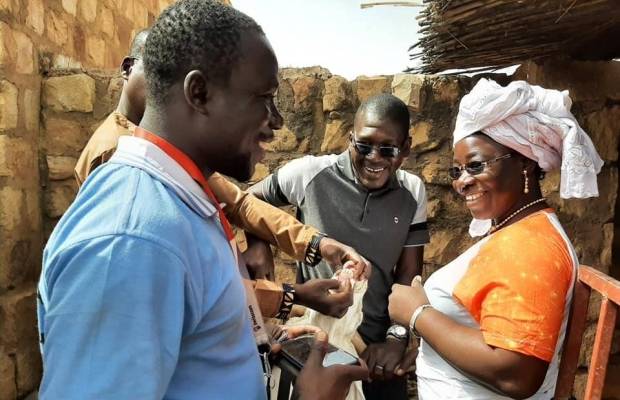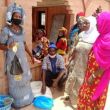Empowering Malian institutions with tools and knowledge to face the challenges posed by food and nutrition insecurity
Project DJAM is active in the Mopti region in Mali to improve the access to vocational training for young people and women from the Dogon country. With help from the project beneficiaries Association Dogon Initiative (ADI) and Lycée Professionnel Sangha (LPS are being capacitated to empower them with the tools and knowledge they need to face the challenges posed by food and nutrition insecurity in the region of Mopti.
The project team worked tirelessly, despite the pandemic, to continue the project’s activities and over the past months progress has been made in the development of curricula, the training of staff, trainers and women groups as well as participating as exhibitors to the Ogobagna culture festival in Bamako.
Development of curricula for LPS
Since the beginning of 2021, the DJAM consortium was able to consolidate and officialize the collaboration with the Malian Ministry of National Education and with its National Department of Technical and Professional Education (DNETP). Between February and May, two commissions of experts from the Ministry and from the consortium of DJAM have worked together to develop two new and innovative curricula for TVET institutions, one in the field of agriculture and one in the field of hydraulics and water management. The new curricula have a strong focus on practical learning and an important entrepreneurship component and aim at responding to the needs of the education and labor market of Mali. After validation by the experts’ commissions, the new curricula will go through the Ministerial approval and accreditation, in order to be piloted at the Lycee Professionnel Sangha (DJAM beneficiary) in the next fall. LPS is the first Lycee Professionnel of Mali and this work within DJAM aims at making it a model for new TVET institutions in Mali.
Training of LPS staff
On May 21, the training of LPS staff (11) has finally started with a virtual workshop on Quality Assurance. After a difficult 2020, troubled by the COVID pandemic and the political and social instability in Mali, the trajectory for the capacity building of the TVET institution has finally started. The Dutch experts of CINOP, with the mediation of local coordinators of ADI, have developed a full training plan remotely, in order to overpass the travel limitations posed by the pandemic and by the insecurity in the Dogon region. Between May and the beginning of August, the teachers and administrators of LPS will attend virtual classes every Friday and complement it with some work from remote. The training includes modules on Quality Assurance, on Entrepreneurship Education, and on Competency Based Education and Training.
The capacity building of LPS will then continue after the summer, with specific trainings on Agricultural Education and on Gender awareness.
Training of Trainers of ADI
After a first module on pedagogy and training techniques held in January, the Training of Trainers of ADI has got to the heart with the first two technical trainings on breeding techniques.
In March, the 14 members of ADI staff attended a training of two weeks by expert provider Delta-C, including a theoretical module and a practical module, on “Small ruminant fattening practices”. The training provided the ADI staff with the knowledge and tools to become themselves trainers on the topic and to share the techniques with the women from the Dogon villages of their network.
In April, a new training of two weeks, including a theoretical module and a practical module, focused on “Poultry farming” started.
Two more trainings on agrobusiness will follow in next fall.
Training of the women groups
After receiving the training by the expert of Delta-C, ADI staff has immediately put to the test their new competences as technical trainers. Two weeks after the practical module, they organized pilot workshops in each of their four epicenters, involving 161 women from the villages nearby. The first pilot trainings, held in April, focused on “Small ruminant fattening practices” and were conducted under the supervision of the expert from Delta-C, who could then give advice and corrections to the staff of ADI to improve their competences as technical trainers.
These training topics will become part of the training portfolio that ADI provides regularly to the women groups and other participants from the region in order to improve the farming and living conditions of people from Pays-Dogon.


Field video-research by YamarouPhoto
In mid-March, the Bamako art collective YamarouPhoto made their second field mission to Pays-Dogon, as part of the training on video-research conducted by Dutch experts of Viewpoint. After months of training and activities from remote, four crew members were able to travel again to the region, where they could shoot video of the trainings of ADI and interviews with Dogon women and local actors, continuing the process of dialogue and co-creation of knowledge that was initiated in 2020. After their return to Bamako, they could work in person with Viewpoint, who travelled to the capital, on the editing of the video material and on improvement of their techniques.
The video produced during this ongoing training by Viewpoint are being shared on an online platform and within the project network and will help the dissemination of knowledge and awareness about the living conditions and the resilience of communities in Pays-Dogon.
DJAM at the Ogobagna Art Festival
From the 22nd to the 28th of March, project DJAM had the honor to participate as exhibitors to the Ogobagna culture festival in Bamako. Ogobagna, at the 6th edition, is an internationally known festival (25.000 - 30.000 visitors in previous years) that celebrates and promote the Dogon heritage, transmit ancient cultural practices and ensure cultural, economic and social survival.
Thanks to the work and presence of local coordinators ADI, of Dutch project partners Viewpoint and of their trainees of YamarouPhoto, and with the support of Koninklijke Rijnja and of the Dutch Embassy, the consortium DJAM could exhibit the photo and videos shot at Pays-Dogon since the beginning of the project. By bringing out local voices, Viewpoint and YamarouPhoto captured inspiration, thought, purpose and complexity to inform the work and joint learning process of DJAM. The participation to the festival was a great opportunity to disseminate some of the knowledge acquired during the project and to bring awareness on the resilience of Dogon communities to the urban context of Bamako, where people often ignore the conditions of the rural regions.
During the festival, DJAM could also organize a workshop on the 24th of March, with the objective of putting rural women in touch with those of urban areas to exchange experiences and ideas on subjects as varied as leadership, entrepreneurship, and development of value chains. The conference was successful and enabled the about 30 participants (women of the DJAM project, panelists, political staff of the NGO ADI, women leaders from local NGOs and companies) to learn from each other through exchanges of experiences and good practices. But above all, it allowed to communicate the consequences on communities, and particularly women and girls, of the conflict raging in the north and center of Mali. This conference served as a space to raise awareness but also to deconstruct certain erroneous perceptions that some people have of these inter-community conflicts.
The workshop set the ground for future collaborations and possibly for the development of an exchange platform to enhance these women groups and women leaders in their support to the resilience of their communities.
About the project
This project is being implemented by Maastricht School of Management (MSM), Partners Pays-Dogon (PPD), CINOP, Viewpoint and Université DELTA – C to improve the access to vocational training for young people and women from the Dogon country. The consortium partners with project beneficiaries Association Dogon Initiative (ADI) and Lycée Professionnel Sangha (LPS) to empower them with the tools and knowledge they need to face the challenges posed by food and nutrition insecurity in the region of Mopti.
Orange Knowledge Programme
This project is part of the Orange Knowledge Programme (OKP) which is funded by the Netherlands’ Ministry of Foreign Affairs and managed by Nuffic. For more information click here.
Related news
Communities are standing strong in Mali with help of project DJAM
DJAM activities able to continue due to strong partnerships
Project DJAM in Mali officially started

